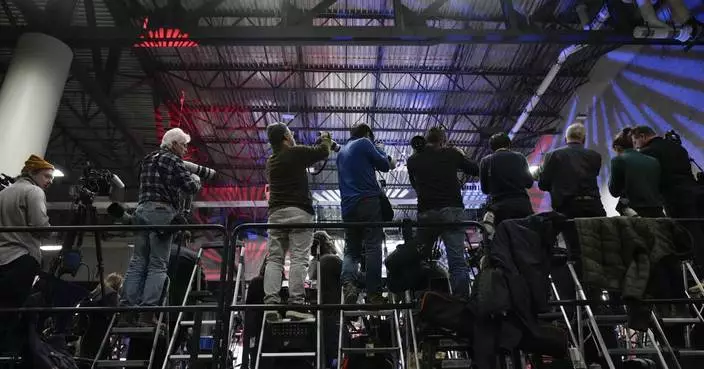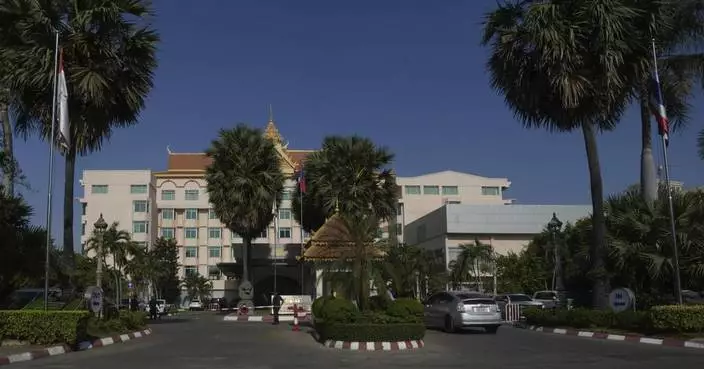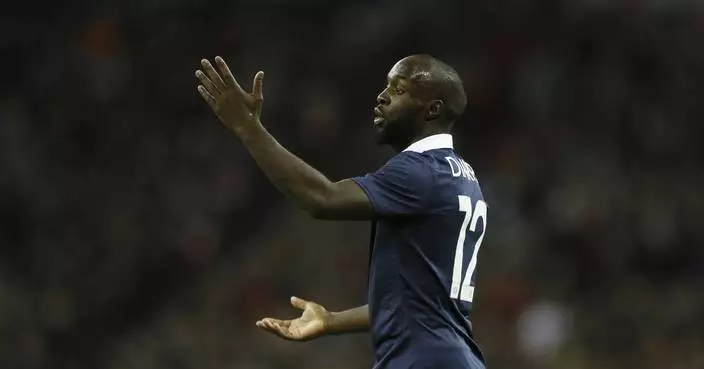"Where's Terrence Malick?"
It's a familiar question for the famously press-shy filmmaker that was, predictably, hollered again Monday at the Cannes Film Festival. Malick, whose "Tree of Life" won the Palme d'Or in 2011, returned to the French festival with a movie whose title could double for a description of the seldom-seen director himself: "A Hidden Life."
The film, based on the true story of an Austrian conscientious objector to Adolf Hitler's army in World War II, premiered Sunday night in Cannes where Malick was, in fact, in attendance. Though he eluded the festival's red carpet photographers, a tuxedoed Malick was given a warm standing ovation following the film. The filmmaker — whom TMZ (not known for the most refined taste in film) has called "a Hollywood Bigfoot" — was even caught in a handful of photographs that quickly circulated on social media.
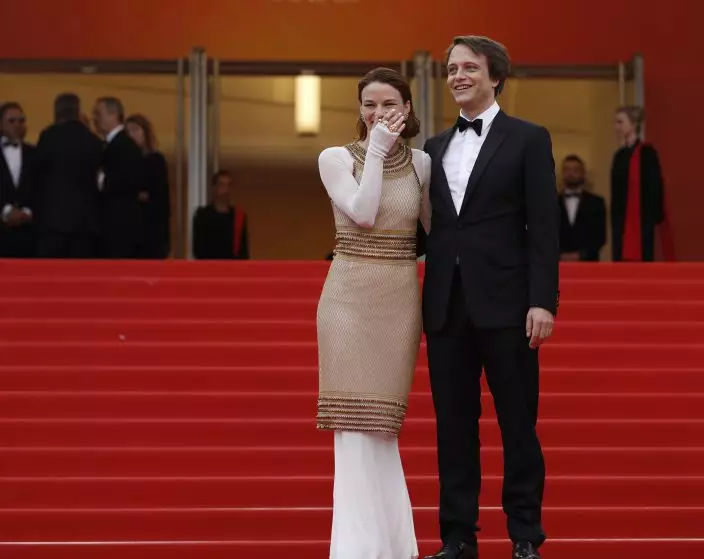
Actors August Diehl, right, and Valerie Pachner pose for photographers upon arrival at the premiere of the film 'A Hidden Life' at the 72nd international film festival, Cannes, southern France, Sunday, May 19, 2019. (AP PhotoPetros Giannakouris)
Perhaps that made some in the Cannes press corps hopeful that Malick would show up at the film's press conference Monday, too. After all, the reclusive Jean-Luc Godard called in to talk to reporters on FaceTime last year . But the lone representatives for the film — stars August Diehl and Valerie Pachner — had no response to shouts about Malick's whereabouts other than: "We don't know!"
The more exciting reveal for critics, anyway, was "A Hidden Life." The film is about Franz Jagerstatter (Diehl), who refused to fight for the Nazis. When he's imprisoned, his wife (Pachner) raises their three daughters alone while tending to their alpine farm on a lush mountainside.
"A Hidden Life," which runs about three hours, was hailed by some critics as the director's best film in years, perhaps since "The Tree of Life." In some critical quarters, Malick's more recent output — including "To the Wonder," ''Knight of Cups" and "Song to Song" — have grown too full of performative bliss, and lack the cohesion of earlier films like "The New World" and "The Thin Red Line."
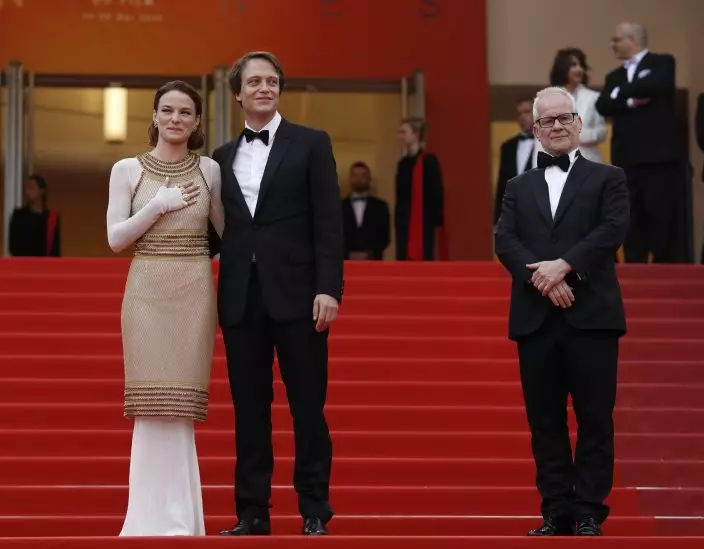
Actors August Diehl, centre, Valerie Pachner and festival director Thierry Fremaux pose for photographers upon arrival at the premiere of the film 'A Hidden Life' at the 72nd international film festival, Cannes, southern France, Sunday, May 19, 2019. (AP PhotoPetros Giannakouris)
While "A Hidden Life" may not win back many who have strayed from Malick's flock, its majesty is more grounded in a linear narrative, one deeply rooted in spirituality and faith. IndieWire called it a "lucid and profoundly defiant portrait of faith in crisis." Variety called it "an epic return to form."
Fox Searchlight acquired "A Hidden Life" shortly after its premiere.
As is often the case with Malick's productions, the film was shot years before finally seeing the light of day. Diehl and Pachner said they, too, patiently awaited updates on its post-production progress.
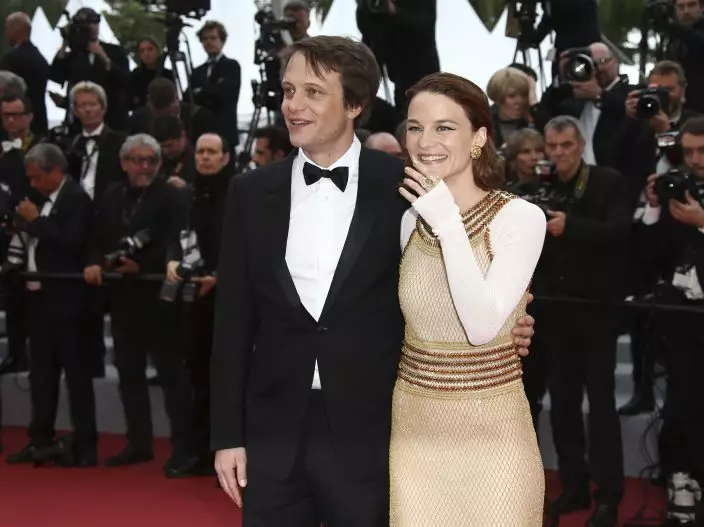
Actors August Diehl, left, and Valerie Pachner pose for photographers upon arrival at the premiere of the film 'A Hidden Life' at the 72nd international film festival, Cannes, southern France, Sunday, May 19, 2019. (Photo by Joel C RyanInvisionAP)
"It seems to not be a linear process this editing. It's more like circles," said Pachner. "We talked to Terry and the editors throughout those two and a half years, and they'd always be like: 'It's so good you didn't see it already because now it's so different now and it's so much better now.'"
The passage of time was enough to see several of its actors, Bruno Ganz and Michael Nyqvist, pass away in the interim. But Diehl said the arrival of "A Hidden Life" is timely.
"The person who says, 'No' — this is getting more and more rare in our whole world. We're all jumping on one train and saying, 'Yes, that's the world now. We have to go with it,'" said Diehl. "If there would be more people like this, especially right now in Europe with all the political developments, it would maybe be a solution. Maybe that's a bridge to our days."
Diehl pointed to the rise of the far-right in Europe and elsewhere as a further connection to "A Hidden Life." Later this week, elections to the European Parliament will be held in 28 countries.
"It is time to stand up against all this right-wing development in the whole of Europe. It's going a very wrong way," said Diehl. "We all have our private choices to make. Our voice counts, I think. Each voice."
Follow AP Film Writer Jake Coyle on Twitter at: http://twitter.com/jakecoyleAP
BEIRUT (AP) — The European Union announced Thursday an aid package for Lebanon of 1 billion euros — about $1.06 billion — much of which will go to boost border control to halt the flow of asylum seekers and migrants from the small, crisis-wracked country across the Mediterranean Sea to Cyprus and Italy.
The deal follows other EU aid packages for countries such as Egypt, Tunisia and Mauritania to fortify their borders. It comes against a backdrop of increasing hostility toward Syrian refugees in Lebanon and a major surge in irregular migration of Syrian refugees from Lebanon to Cyprus.
European Union Commission President Ursula von der Leyen said during a Beirut visit with Cypriot President Nikos Christodoulides that the aid distribution will start this year and last till 2027.
The bulk of the aid — 736 million euros — would go to support Syrian refugees “and other vulnerable groups” in Lebanon, while 200 million euros are meant to bolster Lebanese security services in enforcing border and migration control, according to figures provided by the Cypriot government.
An unspecified amount would go to Lebanese fishermen, to discourage them from selling their boats to smugglers.
Von der Leyen said the EU will also work on a “more structured approach to voluntary return" of Syrian refugees "in close cooperation with” the U.N. refugee agency. The bloc will continue to maintain “legal pathways” for resettlement of refugees in Europe, she said.
Lebanon's caretaker Prime Minister Najib Mikati praised the package, saying that “Lebanon’s security is security for European countries and vice versa,” and that an escalation of the crisis ”will not be limited to Lebanon but will extend to Europe."
Lebanon, which has been in the throes of a severe financial crisis since 2019, hosts nearly 780,000 registered Syrian refugees and hundreds of thousands more who are unregistered, the world's highest refugee population per capita.
Lebanese political officials have for years urged the international community to resettle the refugees in other countries or assist their return to Syria — voluntarily or not. Lebanese security forces have stepped up deportations of Syrians over the past year.
Tensions further flared after an official with the Christian nationalist Lebanese Forces party, Pascal Suleiman, was killed last month in what military officials said was a botched carjacking by a Syrian gang. The incident prompted outbreaks of anti-Syrian violence by vigilante groups.
Meanwhile, Cypriot authorities complain the island nation has been overwhelmed by irregular migration of Syrian asylum seekers, many of them coming on boats from Lebanon.
The UNHCR in Lebanon said it had verified 59 “actual or attempted” departures by boats carrying a total of 3,191 passengers from Lebanon between January and mid-April, compared to three documented boat movements carrying 54 passengers in the same period last year. Usually, few boats attempt the much more dangerous crossing in the winter. In all of 2023, UNHCR recorded 65 boat departures carrying 3,927 passengers.
Cyprus has taken a new approach to halting the flow of migrants. Last month, it suspended processing of Syrian asylum applications, and human rights groups accused the Cypriot coast guard of forcibly turning back five boats carrying about 500 asylum seekers coming from Lebanon. Cypriot officials have denied this.
Bassel al-Shayoukh, a Syrian refugee from Idlib living in Lebanon since 2014, said his brother and several cousins and nephews were on one of the boats turned back. Now he wants to make the journey himself.
“In the beginning I thought that in a year or two the war would be over in Syria,” he said, but it dragged on, while in Lebanon “every year ... the situation began to get worse.”
Shayoukh said he fears being beaten by vigilantes or deported to Syria after Lebanese authorities declined to renew his residency permit.
His 17-year-old nephew, who declined to give his name fearing for his safety, said the Cypriot coast guard started making waves to push the boat he was on away. “I was terrified... I don’t know how to swim,” he said. “I thought we were going to die.”
The people on the boats “stayed three days without food or water” before turning back to Lebanon, the teen added.
Back in Lebanon, they were detained by the army; those registered with UNHCR were released and the others deported.
Mohammed Sablouh, a Lebanese human rights lawyer who works on refugee and migrant cases, says Lebanese authorities are deliberately “turning a blind eye" to the surge in migration to "pressure the international community.”
The Lebanese army did not respond to a request for comment on their measures to combat smuggling.
Thursday's aid announcement comes ahead of the annual fundraising conference for the Syrian crisis in Brussels later this month. After 13 years of civil war, donor fatigue has set in while the world’s attention is occupied by the humanitarian fallout of more recent conflicts in Ukraine and Gaza.
The Cypriot president said Thursday was a “historic day” and called for European officials to go farther and declare some areas of Syria safe for return.
“The current situation is not sustainable for Lebanon. It is not sustainable for Cyprus, it is not sustainable for the European Union,” Christodoulides said.
But not all Lebanese officials are convinced the European aid would solve the problem.
Lebanese Forces party head Samir Geagea told The Associated Press earlier this week that European authorities are mainly concerned “that the refugees don’t go to Europe."
"For us the problem is that we cannot have our country drowning in illegal Syrian refugees,” Geagea said, urging for Syrians to be sent back to either government or opposition-held areas of the neighboring country.
But Shayoukh says he has nowhere to go.
The Damascus government wants him for opposing Syrian President Bashar Assad, he said, while the Islamist group that now controls his hometown behaves "the same way as the regime’s intelligence services” in crushing dissidents.
Associated Press writer Menelaos Hadjicostis in Nicosia, Cyprus, contributed to this report.
Follow AP’s global migration coverage at: https://apnews.com/hub/migration

Lebanese caretaker Prime Minister Najib Mikati, center, speaks during his meeting with Cyprus' President Nikos Christodoulides, left, and President of the European Commission Ursula von der Leyen at the government palace in Beirut, Lebanon, Thursday, May 2, 2024. (AP Photo/Hassan Ammar)
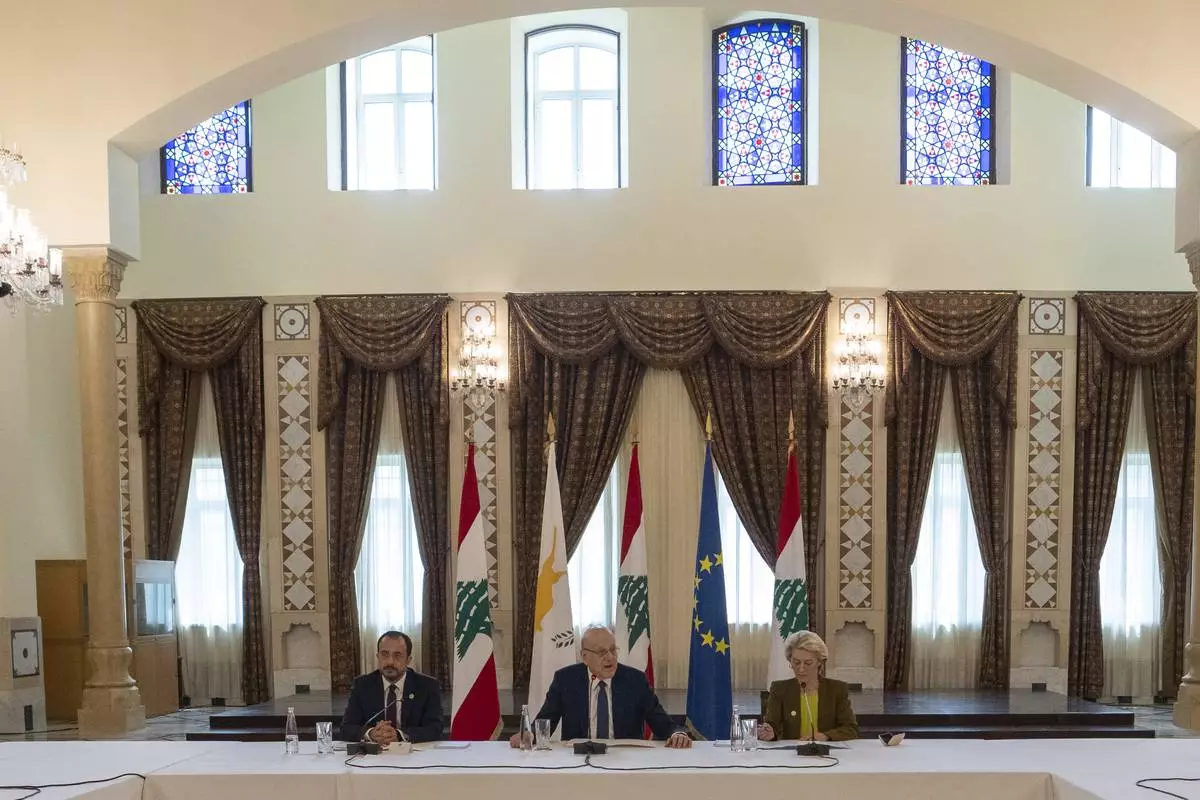
Lebanese caretaker Prime Minister Najib Mikati, center, speaks during his meeting with Cyprus' President Nikos Christodoulides, left, and President of the European Commission Ursula von der Leyen at the government palace in Beirut, Lebanon, Thursday, May 2, 2024. (AP Photo/Hassan Ammar)

Lebanese caretaker Prime Minister Najib Mikati, center, welcomes Cyprus' president Nikos Christodoulides, left, and President of the European Commission Ursula von der Leyen before their meeting at the government palace in Beirut, Lebanon, Thursday, May 2, 2024. (AP Photo/Hassan Ammar)
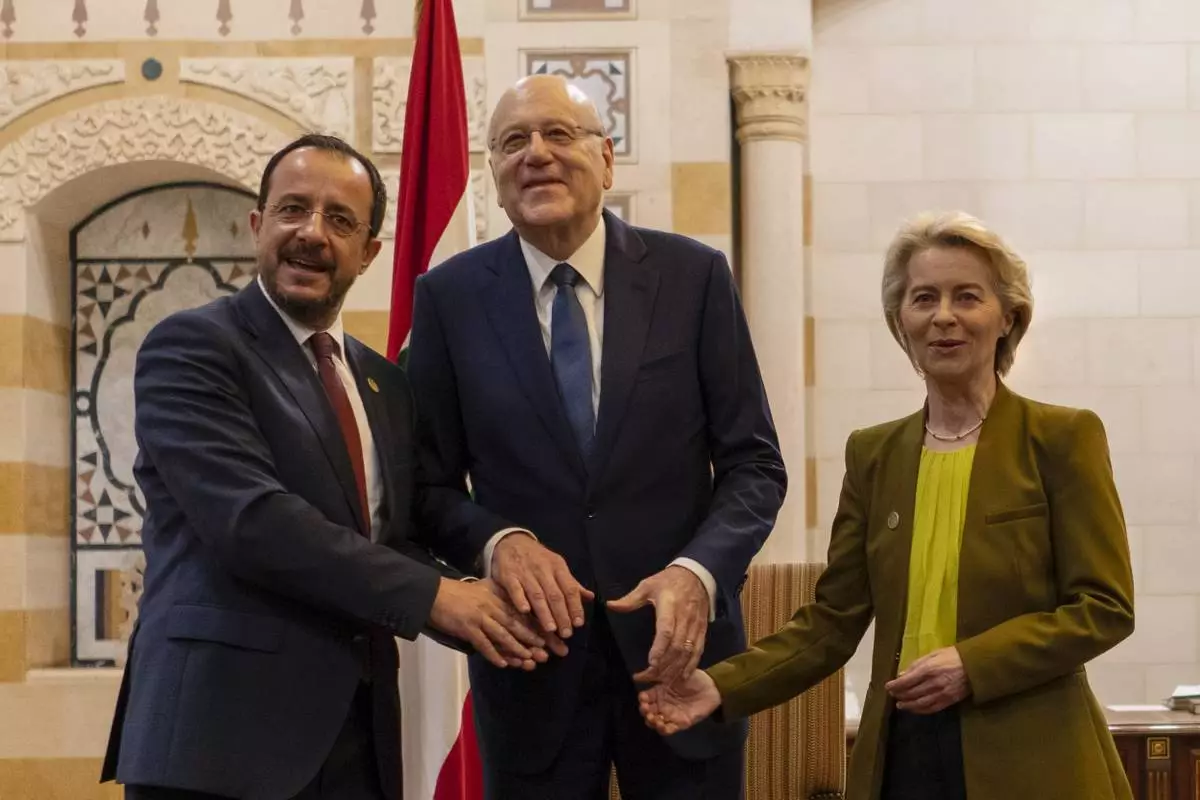
Lebanese caretaker Prime Minister Najib Mikati, center, Cyprus' President Nikos Christodoulides, left, and President of the European Commission Ursula von der Leyen pose for photograph at the government palace in Beirut, Lebanon, Thursday, May 2, 2024. (AP Photo/Hassan Ammar)

Lebanese caretaker Prime Minister Najib Mikati, right, welcomes Cyprus' president Nikos Christodoulides before their meeting at the government palace in Beirut, Lebanon, Thursday, May 2, 2024. (AP Photo/Hassan Ammar)

Cyprus' President Nikos Christodoulides, left, and President of the European Commission Ursula von der Leyen, center, review an honor guard upon their arrival to meet with the Lebanese Speaker Nabih Berri, in Beirut, Thursday, May 2, 2024. (AP Photo/Hussein Malla)

Lebanese caretaker Prime Minister Najib Mikati, center, speaks during his meeting with Cyprus' President Nikos Christodoulides, left, and President of the European Commission Ursula von der Leyen at the government palace in Beirut, Lebanon, Thursday, May 2, 2024. (AP Photo/Hassan Ammar)
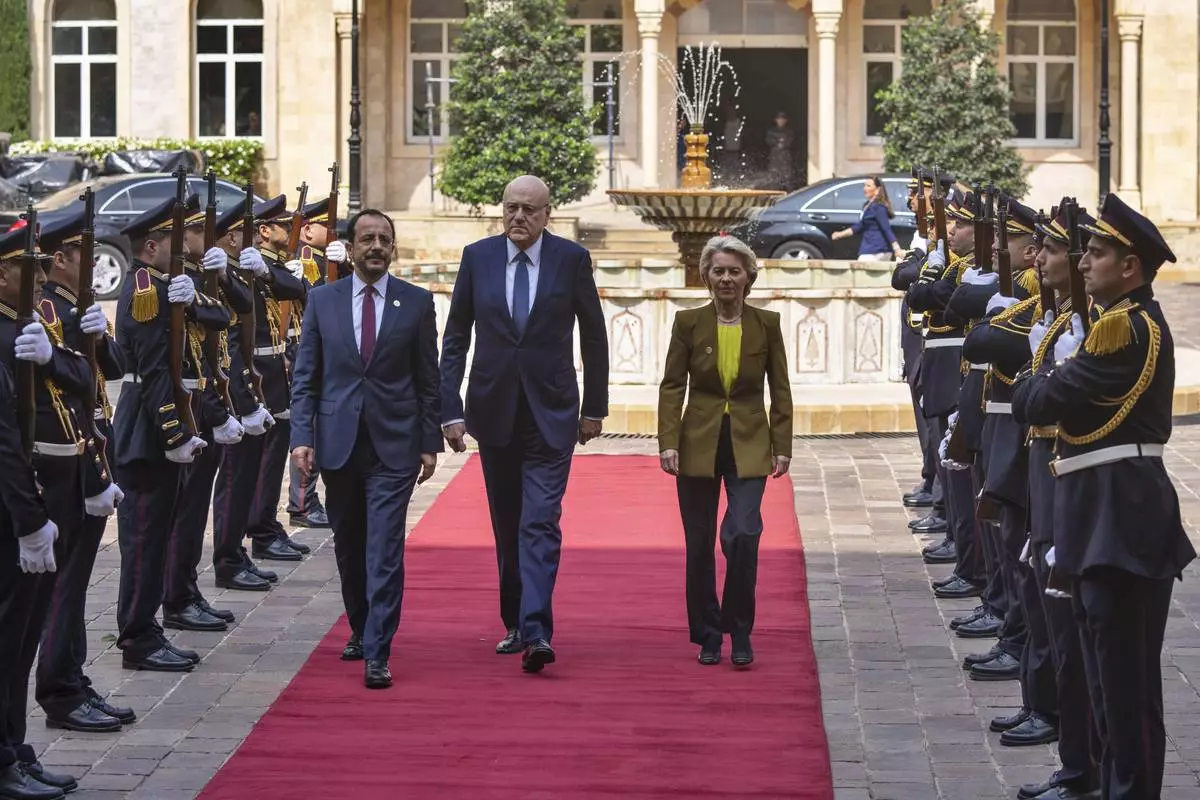
Lebanese caretaker Prime Minister Najib Mikati, center, welcomes Cyprus' President Nikos Christodoulides, left, and President of the European Commission Ursula von der Leyen at the government palace in Beirut, Lebanon, Thursday, May 2, 2024. (AP Photo/Hassan Ammar)














